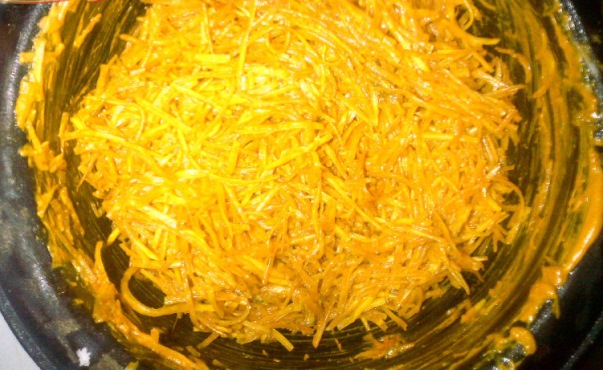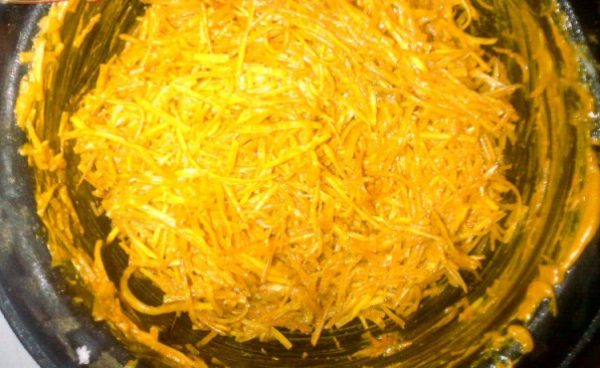On our menu, today is Abacha, a well-loved local delicacy in Igboland. (Well, this food also shares the same spelling as the name of the infamous late Nigerian dictator, Gen. Sani Abacha.) Abacha is also called African Salad; this meal can be served as an appetizer or a main dish. It is a ceremonial food in most parts of Enugu State. It can be served warm or cold.
Ingredients
Abacha
Ukpaka
Kpomo
Frozen fish
Stockfish
Palm oil
Crayfish
Ehuru
(calabash nutmeg)
Locust beans
Edible potash
Stock cubes
Onions
Pepper
Salt
Garden
eggs
Utazi/Garden
Egg Leaves
How to Cook
Rinse your kpomo and stockfish and cook till tender. Strain the water. Blend some pepper and onions and pour it over the kpomo. Also, add stock cube and salt to it and fry with a little oil. Cut the frozen fish, season it with pepper and salt then fry. Rinse your dry fish in lukewarm water. Set these aside for later use.
Next, rinse the ukpaka in lukewarm water and strain. Dissolve potash in a little water and sieve out the particles. Pound or blend the crayfish, pepper, locust beans and ehuru. Please note that before blending the ehuru, the shell is first removed. Chop onions and set aside for later use. Rinse and dice the garden eggs. Rinse and slice the utazi or garden egg leaves. Also set these aside.
Put the Abacha in a bowl and soak it. There are two ways of doing this. You can soak it in cold water for about ten minutes before using a sieve to strain out the water. The second way of soaking abacha is what I call the sharp-sharp method. Simply pour hot water over the abacha; use a spoon to stir the Abacha to ensure that the water touches all of it. Leave to soak for a minute then strain out the water using a sieve.
Pour the palm oil into a clean sizeable pot. If the palm oil is thick, warm it on low heat. Otherwise, add the filtered potash liquid into the oil and stir until the mixture thickens. Add the blended ingredients, stock cube(s) and salt. Mix the ingredients until they are well combined. Add the stockfish, the already strained abacha and ukpaka, as well as the garden eggs to the mixture. Use your hand or a cooking spoon to thoroughly incorporate them into the palm oil mixture. Taste for salt and adjust if necessary.
Your abacha is ready. The chopped onions and utazi leaves are optional for some people. Not everyone in my home likes it so we usually add it during service to the plates of those who care for it.
Featured image source: Afro Tourism


